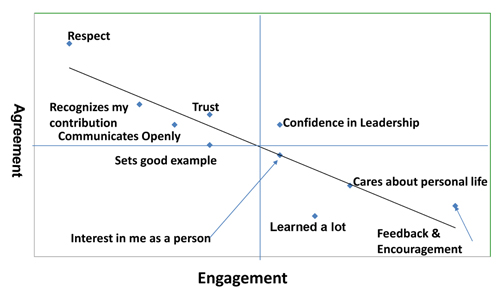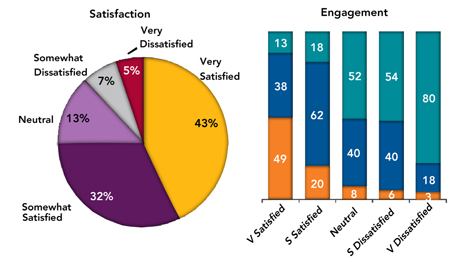Enhancing Employee Engagement: The Role of the Immediate Supervisor
Engagement, the employee’s commitment to his or her organization and the willingness to perform beyond expectations, has become a focus area for management. Engagement is more than mere job satisfaction; fully engaged employees are motivated and dedicated to making the organization a success. At the most simplistic level, engaged employees lead to happy, loyal customers and repeat business. Engagement also leads to improvement in retention levels. In short, it impacts the bottom line.
Dale Carnegie Training asked MSW Research to undertake a benchmark nationwide cross industry study of 1500 employees to explore engagement in the workplace. The study discovered that although there are multiple factors affecting engagement, the personal relationships between a manager and his or her direct reports is the most influential.
The Value of the Immediate Supervisor
The immediate supervisor performs a pivotal role. He or she connects an employee to senior management and vice versa, becoming the primary conduit for the flow of information within an organization. Top down, management imparts its goals and values through the supervisor who can best explain to individuals what these mean and how they may affect employees. Bottom up, the immediate supervisor ensures that employees’ voices are heard, listens to their concerns and responds to them, and passes that feedback to senior management.
It is said that employees don’t leave companies; they leave people. What managers do, how they behave, what they say and importantly how they say it affects employees’ attitudes about their jobs and the organization as a whole. Employees who are unhappy and dissatisfied with their immediate supervisors are less likely to identify with the organization’s vision and more likely to be absent or to resign. Employees who are engaged take pride in their work, support organizational goals and are less willing to change jobs for a minor increase in salary.

Employees were asked to rate satisfaction with their immediate supervisor. Forty-nine percent of those employees who were very satisfied with their direct manager were engaged, and an astonishing 80 per cent of those who were very dissatisfied with their immediate supervisor were disengaged.
The Emotional Effect
While the role of emotions in the workplace has been explored in detail in another Dale Carnegie Training white paper, “Emotional Drivers of Employee Engagement,” it is important to note that fully engaged employees express feelings of enthusiasm, empowerment, confidence and value based on their interactions with their direct managers. While a good supervisor makes all employees feel valued and confident, a poor supervisor irritates them and makes them feel uncomfortable.
The importance of this cannot be overstated; the relationship to the immediate supervisor impacts the investment an organization makes in its people. When supervisors communicate positive emotions, the employee feels good about the organization as a whole. Likewise, negative reactions cause a decrease in productivity and morale, leading to disengagement. Moving disengaged employees to full engagement leads to an improvement in employee retention rates, fewer sick days and less absenteeism.
Practical Engagement
Too often supervisors get caught up in the day-to-day business of managing; it’s easy to imagine if there is no immediate crisis that everything is running smoothly. But to achieve full engagement from workers, the line manager needs to be proactive, exhibiting strong leadership and fostering a positive working environment. Thirty-eight percent of employees who express confidence in the leadership ability of the supervisor are satisfied with him or her. Over half of these employees are engaged.
Good supervisors know employees need to develop the right skills to work efficiently. For example, new employees need more guidance than those who have been with the organization for a few years. While they are optimistic and excited to advance within the company, they are unsure of their roles and responsibilities. To succeed, they need feedback to understand what they are doing right and encouragement to help them improve. Immediate supervisors can turn that initial level of enthusiasm into full engagement by setting clear goals and training staff. There is also a need for the supervisors to maintain training as the level of engagement plateaus after three to five years of employment. Fifty-three percent of fully engaged employees say they learned a lot from their supervisor compared to 19 per cent of people who are not fully engaged.
Successful managers lead by example, which generates enthusiasm and inspires employees to work harder. A remarkable 62 per cent of engaged employees say their manager sets a good example, compared to only 25 per cent among those not fully engaged. Supervisors who delegate and trust employees to carry out tasks empower their staff to make decisions; 40 per cent of those who feel empowered are engaged.
Open and honest communication between employee and supervisor allows for greater understanding of both expectations and job performance. Employees who trust and feel respected by their supervisor will be confident that they can speak freely without fear of repercussions. Conversely, a supervisor who fails to communicate openly may lose the confidence of his direct reports and cause them to doubt their own ability or the ideals of the organization. Supervisors who communicate and trust and respect their staff generate the highest levels of engagement.
These consistent, positive interactions with employees promote a spirit of teamwork and cooperation. However, effective immediate supervisors realize a one-size-fits-all approach does not lead to full engagement. For example, disengagement is higher among post graduates than college graduates or those with a high school diploma. Immediate supervisors can ensure these employees feel valued by recognizing their talents. Similarly, low-income and low-level employees are among the most disengaged. The role of the immediate supervisor is vital in ensuring these employees, who are often in clerical or sales positions with direct customer interaction, feel their job is valuable and understand the contribution they make.

Employees perceive their value as an individual through the prism of the immediate supervisor. Recognition of their contribution, along with feedback and encouragement on their performance from their manager, leads to increased confidence, commitment and achievement. Failure to recognize and reward good work can negatively impact employee morale and productivity. Many respondents say that their supervisor respects them, but fewer mentioned that their supervisor provides feedback or encouragement to improve. This last aspect is what most generates engagement
The Caring Manager
It pays dividends for line managers to get to know their staff as this translates into higher levels of engagement and all the consequent positive effects on the organization. An employee wants to feel that the immediate supervisor is interested in him or her as a person and cares about his or her life outside work and its effects on job performance. Research revealed that employees aged 40-49 often become less engaged as they face external family pressures. Supervisors who get to know their employees on a personal level and care about their private lives can counteract this middle-age disengagement.
These caring activities are two of the four most important drivers of engagement. Training the immediate supervisor to care about employees has a major impact on business performance, reducing staff turnover and heightening productivity. This leads to more satisfied customers and increased sales.
Employees have a positive relationship with supervisors who care. Just one-third of respondents believe their manager cares about their personal lives, but 54 per cent of these are engaged. Among the two-thirds who do not believe this, only 17 per cent are engaged. There is a dramatic opportunity to boost engagement by managers demonstrating a caring attitude to staff.








